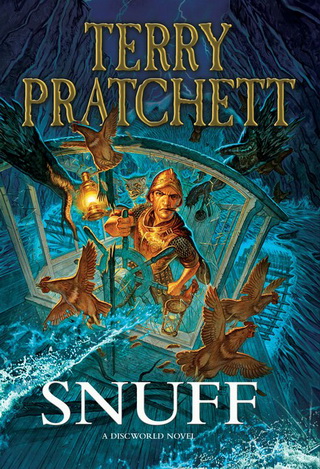I’ll start by talking about a book that seemed to me, in a number of ways, to be about endings, and how it caught me off guard.
A couple of months ago I read what is currently the latest Discworld novel – ‘Snuff’, by the esteemed Sir Terry Pratchett. It took me considerably longer than I expected, but I think that’s my fault, not the book’s. It was about goblins and tobacco and death, and it was good.
 So when I finally did finish it, I was surprised to find that I felt rather bereft. It was initially hard to put my finger on why that was, though. The story had been very enjoyable and entertaining as Pratchett’s works normally are, and the ending was – without meaning to spoil it – pleasing. Yet, closing the book, I felt melancholy. I still feel that way when I think about it, in fact.
So when I finally did finish it, I was surprised to find that I felt rather bereft. It was initially hard to put my finger on why that was, though. The story had been very enjoyable and entertaining as Pratchett’s works normally are, and the ending was – without meaning to spoil it – pleasing. Yet, closing the book, I felt melancholy. I still feel that way when I think about it, in fact.
I think the reasons are twofold and intertwined. The story is about Commander Samuel Vimes and, less prominently, the Ankh-Morpork Watch. We’ve seen Sam grow through previous seven books featuring the Watch from an alcoholic into, essentially, something of an national institution. The Watch stories are possibly my favourites – I think I might have half a dozen copies of Guards! Guards! lying about from where I’ve re-bought it in airports and service stations in advance of a long trip. They’ve got a certain quality about them, perhaps the humour or perhaps the characters, that makes them eminently re-readable and in my opinion some of the best books with which to introduce newcomers to the Discworld. They make excellent vehicles for Pratchett’s brilliant writing, and over the years have matured and refined.
This was the first thing that bothered me about Snuff – it was worryingly quintessential in a way that I can’t nail down. It’s not necessarily a bad thing, of course – being quintessential in this case means that the book was witty and inventive and fun. Yet at the same time, it almost felt like some elaborate forgery, a perfect copy of a great master. I understand that Terry Pratchett, owing to his Alzheimer’s, now dictates his work rather than writing it down himself. I’ve heard him say in an interview that it’s very “natural”. I wonder if that’s the difference, somehow. In any case, I can’t help but feel that this is it, the pinnacle of Pratchett’s style. It reads so much like would I expect a novel of his to, it’s like settling into a well-worn coat – loved, comfortable, but wholly unsurprising. I don’t see how his style could develop from this point. I don’t see how it could be improved.
More to the point, I’m not sure I’d want it to. It is Pratchett.
Which brings me onto the second, far more depressing point. I was quite near the end of the book when it hit me out of the blue and forced me to stop reading. It rather tainted the end of the book for me, if I’m honest.
Simply put, it’s written like he knows he’s not going to write about Samuel Vimes again.
It’s little things, but the overall impression towards the end of the book is one of closure – not just in terms of the story, but in terms of the characters. When I put the book back on the shelf, it was with the feeling that I would probably never read a new story about Samuel Vimes.
Given Sir Pratchett’s tragic illness, I suppose that may be the case, but I hadn’t expected to be confronted with it in his novels.
I wonder if it’s better, though, that these characters get to ultimately walk off into the sunset, rather than fighting on into dangers yet untold, that we get to see their story completed.
I’ll have to think on that.